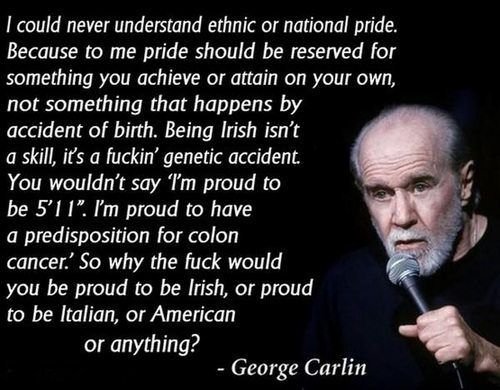We know America has been a hodgepodge of cultures ever since its inception, when British invaders, Native Americans, and African slaves all exchanged cultures. So it's bizarre that many Americans seem to think of "American" culture as "white" culture. If we do it that way, there is no pure traditional American culture, because whites brought England, blacks brought Africa, natives brought, well...America. But since the Native American way of life was steamrolled very quickly, despite giving the invaders so many ideas, it also seems misleading and isolated to call Native American culture "traditional American culture." America has changed very much over the centuries since then. Still, it seems impossible to discuss "American" culture without discussing race.
I think the difficulty of pinning down just what American culture is mainly comes from stubbornness. Although everyone is sharing (whether they want to or not), nobody wants to allow or admit it. For example, if a black person likes The Decemberists, they can be accused of acting white. If a person of Chinese ancestry talks using black slang, people might laugh at them. If a white person wears a kimono, they can be mocked or accused of appropriation. This is completely unnatural, as cultures have always shared, but racial tensions are so intense in the United States, and non-white persons have to take so much flack for expressing their culture, that there's a lot of anger involved in what could be viewed as appropriation or betraying one's own culture.
And the harder someone's life is, the more desperately they cling to a concept of their own culture: something -- anything -- they can be proud of. When you feel disrespected for who you are, sometimes a strong defense is to double down on your "heritage" and try to find pride in that. This is particularly true of so-called "out-groups," which in the US are mainly minority races like African-Americans, but which also include groups like the poor whites of Appalachia. To quote Roland G. Fryer, "Since Coleman, ethnographers have found similar tensions between self-advancement and community integration. Indeed, variants on acting white have been spotted by ethnographers among the Buraku outcasts of Japan, Italian immigrants in Boston’s West End, the Maori of New Zealand, and the British working class, among others." Out-groups and in-groups are afraid to mix.

While I think honoring ancestors and being aware of history is very important, and of course I understand the frustration of watching the very group that mocked you imitating you (as someone always made fun of for wearing glasses, the fake glasses fad drives me nuts), I think the possessiveness is of little use, and smacks of a desire for racial purity. The frustration is real and there is merit in making it plain that you and your culture are not a joke or game. However, like it or not, grits can be called southern or black, democracy can be called Greek or Cherokee, hamburgers can be called German or American, and almost nobody's blood is in pure alignment with their apparent race. No culture was formed in a vacuum. Even the supposedly pure Japanese are all mixed up with Ainu, Korean, Chinese, Filipino, and so on; and many Nazis did not even realize they had Jewish ancestry. Purity of either culture or race is a myth.
So what is American culture? It's all of it. Just because certain foods, music, lifestyles, etc., are more prevalent in certain groups, doesn't mean that American culture only belongs to one group, the first group, the most powerful group, or the biggest group. American culture is moccasins, hip-hop, blue jeans, cajun-fried catfish, punk rock, surfing, skyscrapers, and all the rest. No group can cling to a cultural element forever. If other people like it, they will take it -- and that goes for everyone. People want to point to something complete and well-rounded and say, "Now this, THIS is true American culture." There is American culture, but it can't be summarized in white culture or New York City culture or the same chain businesses you see across the country. American culture is what it always has been: a beautiful fucking mess.
And neither its whole nor parts define you.
For most European and Asian countries, it took over thousand years to form certain cultural stereotypes and cultural paradigms. Back then, people lived in a fairly strict isolation which defined their particular cultural ways and traditions. For a long time, the majority of people couldn’t read or write and legends and fairytales very transferred verbally.
America is a young country, which was formed relatively recently and because of the constant influx of immigrants the nation is not completely formed yet. If this policy would have been curbed, I think American culture would be much more homogeneous.
However, if the current liberal tendency for globalization, open borders, etc. would prevail while the world would change much, and cultural identities between countries would become less and less pronounced.